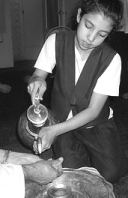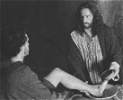Urchatz -
Washing the Hands before Eating Karpas


The second activity of the traditional Passover Seder is to wash your hands before you eat the karpas. Note, however, that the blessing recited for handwashing (netilat yadayim) is intentionally left unrecited at this point in the service.
The Talmud asks, "Why do we wash our hands at this point in this Seder?" And answers that it is an unexpected activity that prompts the children to ask questions. In fact, much of Passover is designed with the child in mind, since it is written "In every generation, each person must feel as if he personally had come out of Egypt, as the Torah says: "You should tell your child on that day, 'When I left Egypt, Adonai did miracles for me.'"
Learn Hebrew

Hand Washing Procedure
The seder leader calls out, "U'rchatz!" and then everyone present will begin the ceremony of washing their hands.
Fill a cup or vessel with water and pour some over your right hand three times, then over your left hand three times. It is customary for children to present the towel to the guests as each person performs the ritual.
Jesus and Urchatz
It is possible that the Jesus washed His disciples feet at this point of the early Seder he had with the disciples. Imagine the disciples passing the urchatz pan from person to person for the ritual cleansing of hands. Then,
"Jesus laid aside his outer garments, and taking a towel, tied it around his waist. Then he poured water into a basin and began to wash the disciples' feet and to wipe them with the towel that was wrapped around him. He came to Simon Peter, who said to him, "Lord, do you wash my feet?" Jesus answered him, "What I am doing you do not understand now, but afterward you will understand."

Peter said to him, "You shall never wash my feet." Jesus answered him, "If I do not wash you, you have no share with me." Simon Peter said to him, "Lord, not my feet only but also my hands and my head!" Jesus said to him, "The one who has bathed does not need to wash, except for his feet, but is completely clean. And you are clean, but not every one of you." For he knew who was to betray him; that was why he said, "Not all of you are clean." When he had washed their feet and put on his outer garments and resumed his place, he said to them, "Do you understand what I have done to you?" (John 13:4-12)
Hebrew for Christians
Copyright © John J. Parsons
All rights reserved.